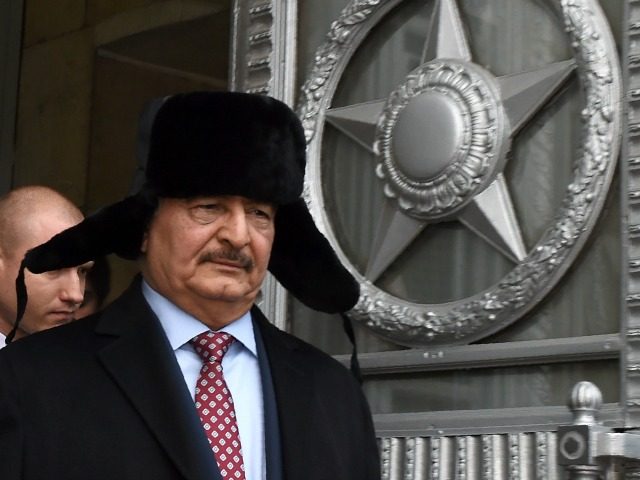WASHINGTON, D.C. — Moscow’s foothold in war-devastated Libya “is growing” as Russian President Vladimir Putin “increasingly” supports former Gen. Khalifa Haftar, the leader of the opposition to the United Nations-backed Government of National Accord (GNA), an expert on Russian foreign policy tells a House panel.
In March, Gen. Thomas Waldhauser, the head of U.S. Africa Command (AFRICOM), told the Senate Armed Services that Russia’s intervention in Libya, including Putin’s support for Gen. Haftar, dubbed the “new” Muammar Gaddafi, is “very concerning” for the American military.
Although Russia has hosted both Gen. Haftar and Libyan Prime Minister Fayez al-Sarraj, who serves as the chief of the GNA, Putin favors the opposition leader.
During a hearing on Russia’s objectives in the Muslim world held Thursday by the House Foreign Affairs Subcommittee on the Middle East and North Africa, Anna Borshchevskaya, an expert on Russian foreign policy at the Washington Institute for Near East Policy, told lawmakers:
Moscow’s foothold in Libya is growing. This issue is important to watch in the months ahead. Putin increasingly supports Libya’s Gen. Khalifa Haftar, who controls the oil-rich eastern part of the country but wants more. With the fall of Muammar [Gaddafi] in October 2011, Russia lost not only several billion dollars’ worth of investments but also access to the Benghazi port.
U.S.-backed militias overthrew and executed Libyan dictator Gaddafi (also spelled Qadhafi), in 2011.
Borshchevskaya noted:
Haftar (who served under Qadhafi) pursues an anti-Islamist agenda and looks to Putin to help secure his leadership in Libya at the expense of the UN-backed civilian government. Haftar is a deeply polarizing figure, one that by expert accounts is the wrong choice for the country.
Echoing other assessments, American Gen. Waldhauser indicated that Gen. Haftar represents an opportunity for Russia to fill the vacuum left by former President Barack Obama’s administration.
“Russia provides the Tobruk government [led by Haftar] with military advice and diplomatic support at the UN,” the Russian foreign policy expert told the House panel. “In May 2016, Moscow reportedly printed nearly 4 billion Libyan dinars (approximately $2.8 billion) for Libya’s Central Bank and transferred the money to a branch loyal to Haftar.”
Borshchevskaya continued:
In the context of growing tensions with Tripoli, Haftar made two trips to Moscow in the second half of 2016, and in January of this year, he toured the Russian aircraft carrier Admiral Kuznetsov as it returned home from Syrian waters. While aboard the Kuznetsov, Haftar held a video call with Russian defense minister Sergei Shoigu and reportedly talked about fighting terrorism in the Middle East. This February, Moscow flew approximately seventy of Haftar’s wounded soldiers to Russia for treatment.
Moscow has denied allegations that it considers establishing military bases in Libya with Haftar’s support, Borshchevskaya pointed out.
“Russia is trying to exert influence on the ultimate decision of who becomes, and what entity becomes, in charge of the government inside Libya,” the AFRICOM chief told Senators in March. “They’re working to influence that decision.”
Russia’s objectives in the Middle East and North Africa are to support other dictators as well as undermine U.S. influence and democratic efforts, the experts told the House members Thursday.
“Putin’s objectives in the Middle East have been consistent both with his domestic behavior and with his approach to other parts of the world: support fellow dictators and undermine efforts at democratization—what his Foreign Police Concept refers to as ‘ideological values … imposed from outside,’” Mr. Vladimir Kara-Murza, the vice chairman of the pro-democracy organization Open Russia, told lawmakers Thursday.

COMMENTS
Please let us know if you're having issues with commenting.